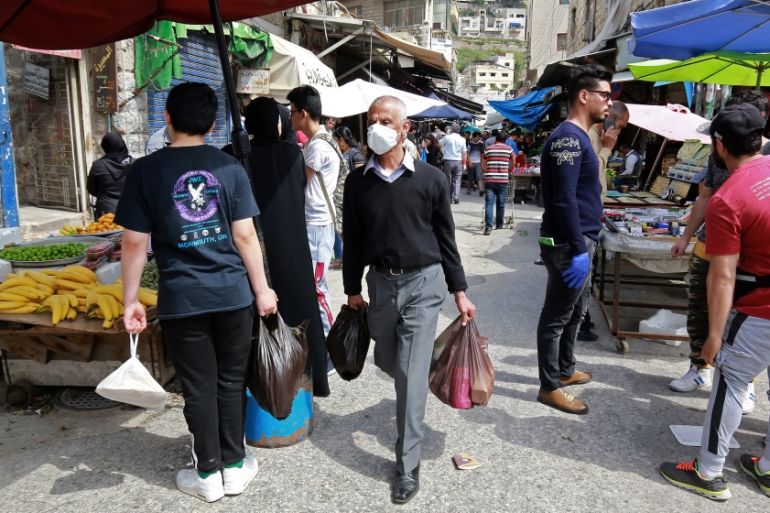Jordan takes major step towards post-coronavirus normality
Amid decline in number of COVID-19 cases, government is allowing businesses and traffic to resume normal operations.

The Jordanian government is moving ahead with steps to resume most economic activities and end movement restrictions after months of lockdown measures aimed at curbing the spread of the coronavirus.
Starting on Saturday, business activities, cafes and restaurants will be allowed to serve customers again while a ban on travel between cities will also be lifted.
Residents will be able to use their vehicles daily between 6am and 12pm without the need for special permits, while domestic flights will also resume.
Authorities have also allowed regular and congregational prayers at the country’s mosques and churches provided that worshippers will obey physical-distancing guidelines and wear face masks.
International travel, however, will remain shuttered for now, while schools, colleges, kindergartens, public parks, movie theatres and festival activities will also stay closed.
Military emergency laws
With a total of 784 confirmed coronavirus cases so far, including 571 recoveries and nine related deaths, Jordan has a pandemic situation that is now classified as “moderate risk” – a level above the lowest category of “low risk”, Prime Minister Omar al-Razzaz said on Thursday.
The lifting of the restrictions comes more than months since King Abdullah on March 17 approved a national defence law that gives the government sweeping powers to enforce a state of emergency.
As part of the emergency measures, Jordan closed its airspace and land border crossings to all commercial passenger travel in and out of out of the country to help it combat the coronavirus pandemic.
It also imposed a round-the-clock lockdown banning all commercial activities except the transport and purchase of essential food supplies. The government began easing those measures in May when it gradually began allowing limited economic activities.
Epidemiologist Bassam Hijjawi, a member of Jordan’s National Epidemic Committee, a body in charge of directing the government’s response to the pandemic, said authorities were taking steps towards post-coronavirus normality because both the infection rate and the number of deaths remained very low.
“Our infection numbers are under control, which justifies lifting the lockdown and activating the economy back to normal activities,” he told Al Jazeera.
Hijjawi said the healthcare system had gained in recent months valuable experiences in dealing with the pandemic and had also developed expertise ready to deal with current or future national medical emergencies.
Hijjawi stressed, however, that while Jordan was not facing a severe outbreak due to the swift introduction of precautionary measures, authorities were ready to reimpose the lockdown and shut down commercial activities should the number of infections start rising to dangerous levels.
Financial challenges
As the country is moving forward towards reopening its economy, questions remain about the financial impact of COVID-19 and the government’s handling of the crisis.
Jawad Anani, an economist and former deputy prime minister, argued that the pandemic exposed the weakness of the government’s economic policies that “underutilised” key economic sectors such as tourism and agriculture.
Predicting that Jordan’s gross domestic product would shrink by two to three percentage points this year, Anani said the pandemic has presented an opportunity for the government to streamline investment opportunities by reforming current cumbersome laws and abolishing red tape that stands in the way of foreign investors.
He also called on the government to revamp the education and healthcare systems to attract foreign students and those who are seeking medical treatment from the region.
“This,” he argued, “is much better than seeking to invest in new economic projects that may or may not work.”
Follow Ali Younes on Twitter: @ali_reports